It can be frustrating when you spend hours writing content, researching keywords, and following best practices for SEO and still don’t see much of an improvement in search engine results.
It’s true that SEO can be hard, especially since algorithms are always changing and competition is growing all the time.
But what if there was a faster way? Imagine having free AI-powered tools that do the hardest parts of SEO for you, like finding high-ranking keywords, automating tasks, and making your content work better.
Yes, these 15 free AI SEO tools can help your rankings go through the roof this year!
Key Takeaways
- AI Tools Simplify SEO: AI-powered SEO tools automate time-consuming tasks such as keyword research, content creation, and site audits, making SEO more efficient and accessible for users at all levels.
- Diverse Toolset: The content covers a wide range of free AI SEO tools, each with unique features such as keyword analysis, backlink tracking, and on-page optimization, catering to various aspects of SEO.
- Improved Rankings and Traffic: These free AI SEO tools are designed to help websites increase their rankings on search engines, driving more organic traffic and improving overall site performance.
- Accessibility for All Users: Many of the tools featured, including Google Search Console and Ubersuggest, are user-friendly, offering free versions that cater to beginners and small businesses without requiring a significant financial investment.
- AI’s Impact on SEO: The use of AI in SEO enables faster and more accurate analysis, allowing users to stay competitive in a constantly evolving digital landscape by offering actionable insights and performance enhancements.
What are AI SEO Tools?
AI SEO tools are software powered by artificial intelligence that help improve a website’s search engine optimization (SEO). These tools automate tasks like keyword research, content creation, on-page SEO analysis, and technical audits.
AI SEO tools provide valuable insights, helping you optimize your website more efficiently to improve rankings on search engines like Google. They simplify SEO efforts, making it easier for users to enhance their site’s performance.
Below is a comprehensive list of 15 free AI SEO tools that will take your SEO strategy to the next level. These tools offer various benefits, from keyword research to content generation, and all are free to use with a free version or free trial.
1. Rank Math
Source: Rank Math
Rank Math is an AI-powered SEO plugin for WordPress that simplifies the optimization process.
It offers features like real-time keyword analysis, content recommendations, and SEO audit reports. The free version integrates with Google Search Console to provide insights that help improve your site’s performance.
- Easy Setup Wizard: Streamlined setup process that configures essential SEO settings automatically.
- On-Page SEO Optimization: Provides real-time suggestions for optimizing titles, meta descriptions, keywords, and content.
- Focus Keyword Analysis: Supports up to 5 focus keywords per post, providing analysis and suggestions.
- Schema Markup Integration: Allows easy integration of schema types like articles, products, reviews, etc.
- XML Sitemap Generator: Automatically creates and updates XML sitemaps for better crawling and indexing.
- Google Search Console Integration: Directly fetches data from Google Search Console and displays it on your WordPress dashboard.
- 404 Monitor: Identifies and helps fix 404 error pages.
- Redirect Manager: Allows for easy management of 301 and 302 redirects.
- Local SEO Tools: Helps optimize your site for local search with features like Google My Business integration.
- Role Manager: Assign specific SEO-related permissions to different user roles on your WordPress site.
2. Seobility
Source: Seobility
Seobility is a comprehensive SEO tool that offers features like site audits, keyword monitoring, and backlink tracking. Its free version provides an in-depth analysis of your site’s performance, identifying errors and optimization opportunities.
It’s especially useful for improving on-page SEO and tracking keyword rankings.
- Website Audit: Comprehensive analysis of your site, checking for SEO errors, technical issues, and on-page optimizations.
- Keyword Monitoring: Tracks rankings of your keywords on major search engines and monitors their performance.
- Backlink Analysis: Evaluate the backlinks pointing to your site and their quality.
- On-Page SEO Checker: Provides insights and suggestions for improving individual pages’ SEO.
- Content Optimization: Helps improve content based on keyword usage and SEO practices.
- Competitor Analysis: Compares your SEO metrics with competitors, analyzing keywords and backlinks.
- Mobile Friendliness Check: Analyze the mobile usability of your website.
- XML Sitemap and Robots.txt Validation: Ensures proper indexing with valid sitemaps and robots.txt files.
- Local SEO: Tracks keyword rankings on a local level, helping with regional optimization.
- Site Crawl Alerts: Notifies you of crawling issues and suggestions for fixes.
Online SEO Software for better website optimization. Seobility comes with all SEO analyses and tools you need
3. AnswerThePublic
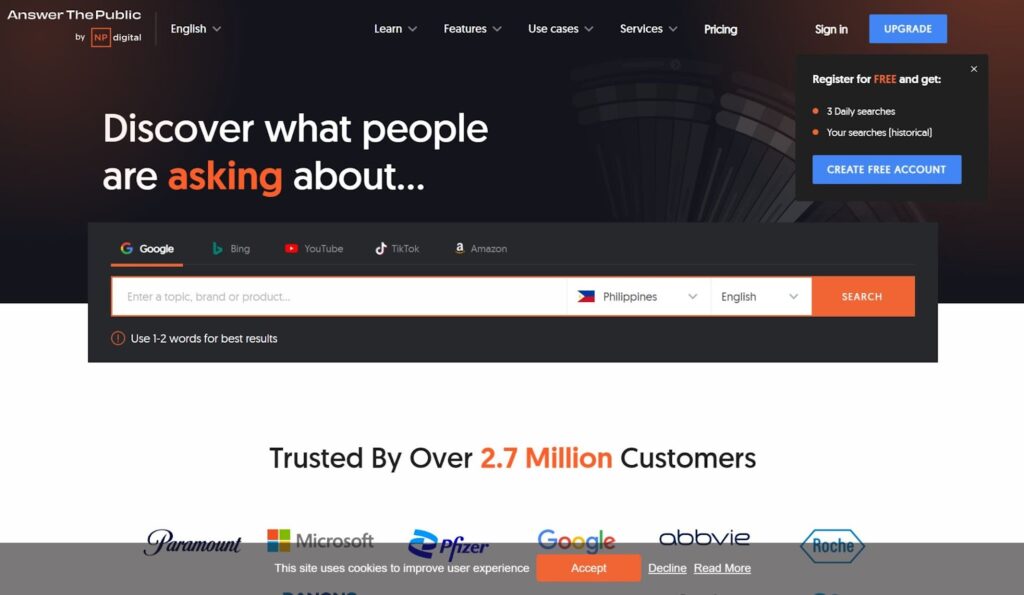
Source: AnswerThePublic
AnswerThePublic helps you discover what your audience is searching for by visualizing search queries.
This tool gathers data from search engines to show the most common questions and topics people are asking, helping you create relevant content. It’s ideal for finding content ideas that resonate with your target audience.
Key Features:
- Question Keywords: Visualizes search questions around a keyword for content ideas.
- Prepositions: Generates keyword ideas based on prepositions (e.g., for, with).
- Comparison Keywords: Helps find comparison-based keywords for targeting comparisons.
- Data export: Allows data to be exported for further analysis.
4. KeywordTool.io
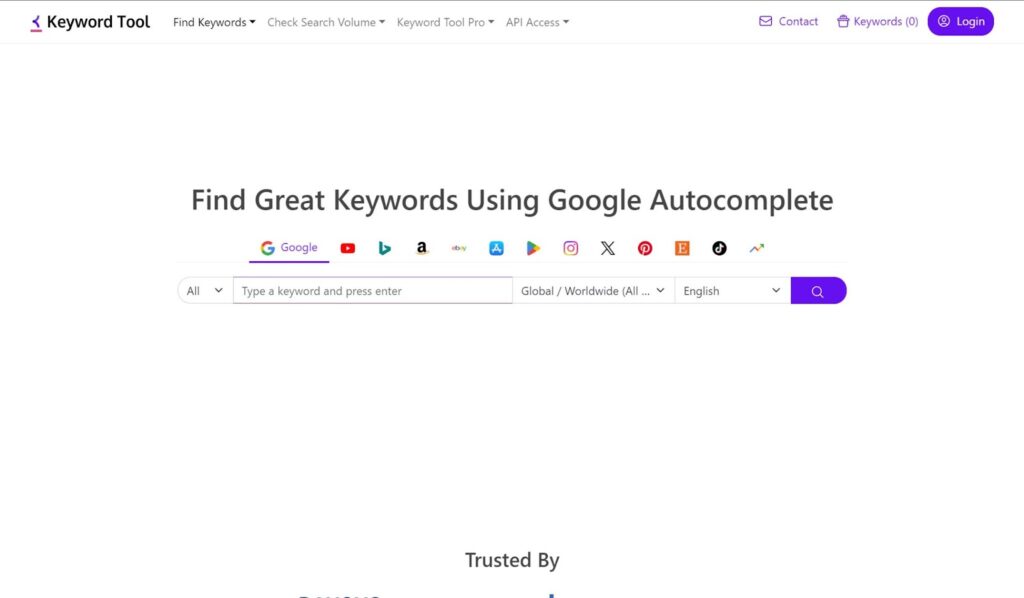
Source: KeywordTool.io
KeywordTool.io is a versatile keyword research tool that helps you find long-tail keywords across multiple platforms, including Google, YouTube, and Bing.
Its AI-driven algorithm generates hundreds of keyword suggestions based on user input. It’s an ideal solution for content creators and SEO professionals looking for niche topics.
Key Features:
- Keyword Suggestions: Generates long-tail keyword suggestions from various platforms like Google, YouTube, Amazon, Bing, etc.
- Search Volume Data: Provides approximate search volume data for the suggested keywords.
- Competitor Keyword Insights: Identifies what keywords competitors rank for on search engines.
- Question-Based Keywords: Offers questions that users are asking about your keywords.
- Multiple Language and Location Support: Allows keyword research for different languages and regions.
5. Screaming Frog SEO Spider
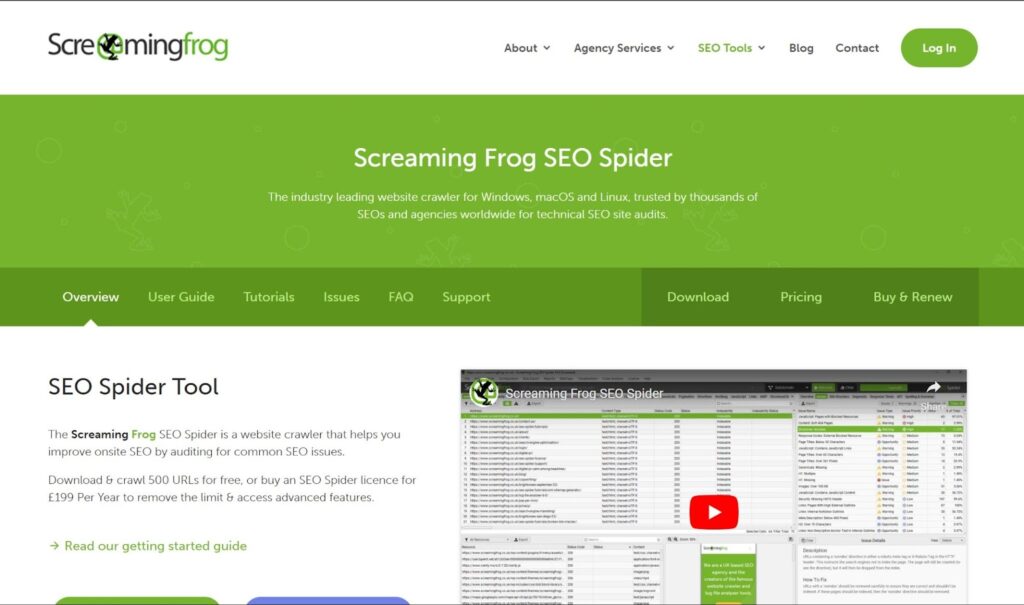
Source: Screaming Frog SEO Spider
Screaming Frog SEO Spider is an advanced site auditing tool that crawls your website to identify SEO issues. It helps you find broken links, duplicate content, and other on-page SEO elements that need improvement.
The free version allows you to analyze up to 500 URLs, making it an ideal solution for small websites.
Key Features:
- Comprehensive Site Crawling: Crawls website URLs and analyzes key on-page elements such as meta tags, headings, and links.
- Broken Link Detection: Identifies 404 errors and broken internal and external links.
- Redirect Audit: Detects any 301, 302, or other redirect chains and loops.
- Duplicate Content Identification: Finds duplicate pages, meta descriptions, and titles.
- XML Sitemap Generation: Automatically creates XML sitemaps for your website.
- Site Structure Visualization: Visualizes the website’s internal linking structure for better navigation.
- Custom Extraction: Allows you to scrape any specific data from the HTML of a page using XPath or CSS Path.
- Google Analytics and Search Console Integration: Combines crawl data with user behavior metrics from Google Analytics.
6. MozBar
Source: MozBar
MozBar is a free Chrome extension that provides on-the-go SEO insights. It allows you to view metrics like domain authority, page authority, and backlink data for any webpage directly in your browser.
It’s perfect for quick competitor analysis or evaluating potential backlink sources while browsing the web.
Key Features:
- On-Page SEO Insights: Provides on-the-go SEO metrics for any webpage (title, description, headings, etc.).
- Domain and Page Authority: Displays domain authority (DA) and page authority (PA) of any site.
- Keyword Difficulty Score: This shows the estimated difficulty of ranking for specific keywords.
- Link Metrics: Offers a quick look at inbound and outbound link metrics directly from the browser.
- SERP Overlay: Shows key metrics for search engine result pages, helping you analyze competitors.
- Highlight Links: Highlights nofollow, follow, external, and internal links on any webpage.
7. SERPSim
Source: SERPSim
SERPSim is a free tool designed to help you optimize your meta titles and descriptions for better performance on search engine result pages (SERPs).
It shows a real-time preview of how your page will appear in search results, allowing you to fine-tune your meta tags for higher click-through rates.
Key Features:
- SERP Preview: Simulates how your web page’s title, meta description, and URL will appear in Google’s search results.
- Character Count: Tracks and alerts if the title or meta description exceeds Google’s pixel limits.
- Rich Snippet Support: Allows you to visualize how rich snippets (like star ratings, prices, etc.) will appear.
- Real-time Updates: As you edit the title or meta description, the tool provides real-time preview updates.
- Mobile & Desktop Views: Lets you preview how the SERP will look on both desktop and mobile devices.
8. Yoast SEO
Source: Yoast SEO
Yoast SEO is a popular WordPress plugin that helps you optimize your content for search engines. It offers real-time suggestions on how to improve your on-page SEO, readability, and keyword focus.
The free version is highly effective for basic SEO tasks, such as optimizing titles and meta descriptions.
Key Features:
- Real-Time Content Analysis: Analyzes your content and provides suggestions for improvement (keyword usage, readability, etc.).
- Focus Keyword Optimization: Helps optimize content for a target keyword by analyzing keyword density, placement, and variation.
- XML Sitemaps: Automatically generates and manages sitemaps for your website.
- Breadcrumb Navigation: Implements SEO-friendly breadcrumb navigation to improve internal linking and user navigation.
- Readability Checker: Analyzes sentence length, paragraph structure, transition words, and other readability factors.
- Canonical URLs: Automatically manages canonical URLs to prevent duplicate content issues.
- Internal Linking Suggestions: Suggest relevant internal links to enhance SEO.
- Google Preview: Provides a preview of how your page will appear in Google search results.
9. Google Trends
Source: Google Trends
Google Trends is a free tool that helps you discover trending topics and keywords. It’s useful for identifying popular search terms in real time, allowing you to tailor your content to meet the current demand.
It’s a great tool for both content creation and keyword research, especially in dynamic industries.
Key Features:
- Trend Analysis: Shows the relative popularity of search terms over time and geographic areas.
- Comparison of Keywords: Allows comparing multiple keywords to see which are gaining or losing traction.
- Seasonal Insights: Help identify seasonal trends for content and product planning.
- Real-time Data: Offers insights into what is trending in real-time, broken down by region.
- Topic Exploration: Suggests related search queries and topics based on keyword input.
10. CanIRank
Source: CanIRank
CanIRank provides an AI-powered analysis of your website’s ranking potential. It offers actionable insights into how you can improve your SEO by comparing your site against competitors.
The tool helps identify areas for improvement, such as on-page SEO, backlinks, and content quality, giving you a clear path to better rankings.
Key Features:
- Actionable SEO Suggestions: Provides step-by-step recommendations for improving your website’s SEO.
- Keyword Difficulty Estimation: Analyzes whether your site can rank for a particular keyword based on its strength.
- Competitive Analysis: Compares your site to competitors for chosen keywords and highlights areas for improvement.
- Content Optimization: Offers content suggestions based on competitive analysis.
- Opportunity Reports: Identifies keywords and backlinks that offer ranking opportunities.
11. Ubersuggest
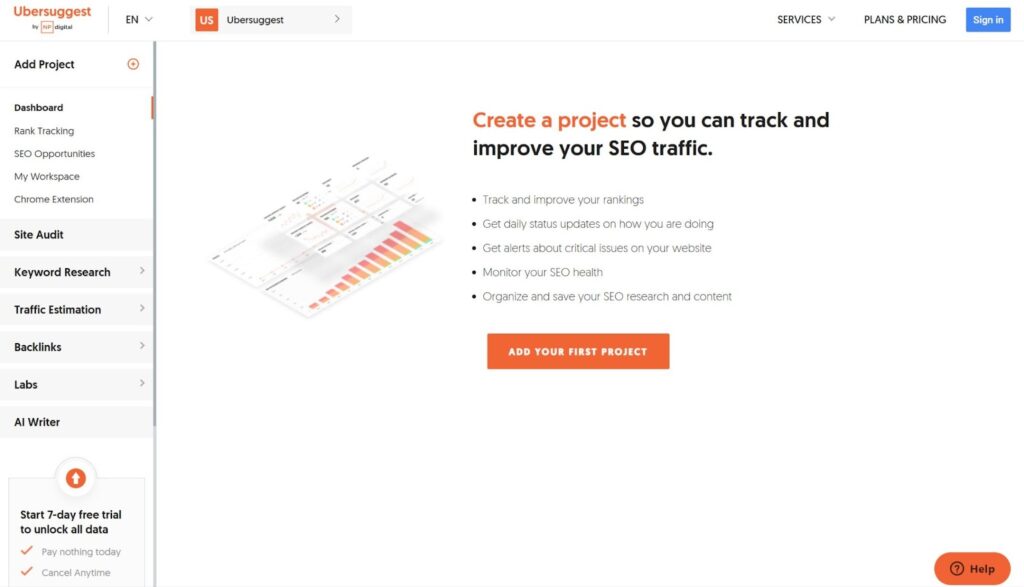
Source: Ubersuggest
Ubersuggest is an excellent tool for keyword research and competitor analysis. Powered by AI, it provides valuable insights into high-traffic keywords, content suggestions, and SEO improvements.
Its intuitive interface makes it easy for both beginners and seasoned SEO professionals to use. The tool also helps identify backlink opportunities and monitor SEO trends.
Key Features:
- Keyword Research: Provides keyword suggestions, search volume, and competition analysis.
- SEO Audit: Offers a detailed SEO health check of your website, including technical and on-page SEO recommendations.
- Backlink Data: Displays backlink profiles, including referring domains and anchor text analysis.
- Competitor Analysis: Offers competitor traffic, keyword insights, and backlink comparisons.
- Content Ideas: Suggests content ideas based on popular topics in your niche.
- Rank Tracking: Monitor keyword rankings over time for desktop and mobile.
- Traffic Estimation: Estimates the organic traffic of websites, both yours and competitors.
12. Woorank
Source: Woorank
Woorank is a free SEO tool that provides a detailed analysis of your website’s SEO health. It offers actionable recommendations for improving site performance, content, and technical SEO elements.
The tool is ideal for both beginners and professionals looking to optimize various aspects of their website.
Key Features:
- In-depth SEO audit reports
- Mobile-friendliness and usability analysis
- Technical SEO recommendations for improvement
13. SEOquake
Source: SEOquake
SEOquake is a powerful Chrome extension that offers instant SEO insights for any webpage. It provides a detailed breakdown of on-page SEO factors, including keyword density, meta tags, and backlinks.
This tool is especially useful for quick competitor analysis and keyword research while browsing.
Key Features:
- SEO Metrics Overlay: Displays key SEO metrics such as PageRank, Alexa rank, and backlink data directly in search results.
- On-Page SEO Audit: Analyzes key on-page elements like meta tags, headings, keyword density, and alt attributes.
- SERP Analysis: Provides a full set of SEO parameters in search results, including rankings, backlinks, and traffic estimates.
- Keyword Density Report: Evaluates keyword usage and suggests improvements to meet SEO best practices.
- Internal/External Link Analysis: This shows the number of internal and external links on a page.
- Backlink Analysis: Provides details on the backlinks pointing to a page.
- Social Metrics: Displays social media stats such as Facebook likes and tweets for web pages.
- Export SEO Data: Export SEO data from pages and search results for offline analysis.
- Customizable Interface: Allows you to configure which metrics to display, adapting the tool to your needs.
14. Google Search Console
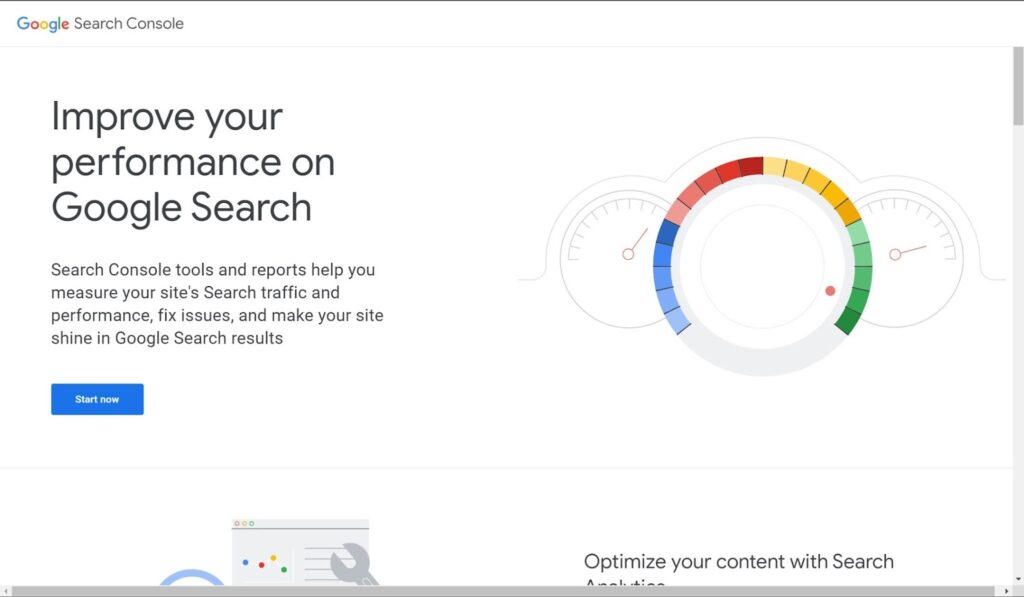
Source: Google Search Console
Google Search Console is a free and essential tool that helps monitor your website’s performance in Google Search results. It offers insights into how Google views your site, helping you fix any technical issues that may affect your rankings.
This tool is especially useful for tracking search traffic, fixing indexing issues, and optimizing your content for better visibility in search results.
Key Features:
- Search Performance Data: View impressions, clicks, CTR, and average position of pages in Google search results.
- Index Coverage Report: Track indexing issues and understand how Google indexes your website.
- Mobile Usability: Monitor mobile usability issues that affect user experience.
- Core Web Vitals: Assess page speed and user experience metrics.
- Manual Actions: Identify and resolve any manual penalties imposed by Google.
- Sitemaps Submission: Submit and monitor XML sitemaps for indexing.
- Link Reports: Analyze inbound and outbound links to your website.
- URL Inspection Tool: Get detailed indexing and serving information about specific URLs.
15. Detailed SEO Extension
Source: Detailed SEO Extension
The Detailed SEO Extension is a Chrome add-on that provides quick access to detailed SEO data for any website you visit. It’s a great tool for competitor analysis, offering insights into backlinks, keyword rankings, and site structure.
It’s ideal for SEO professionals looking for fast, accurate data without leaving their browsers.
Key Features:
- On-Page SEO Insights: Provides in-depth details on meta tags, title tags, headings, and other HTML elements critical for SEO.
- Link Insights: Highlights internal and external links, showing dofollow/nofollow attributes.
- Keyword Usage: Identifies and analyzes the keywords used on the page and their frequency.
- Schema Markup Detection: Detects the presence of schema markup and structured data on the page.
- Meta Description and Title Analysis: Reviews and provides insight on the effectiveness of meta descriptions and titles.
- Canonical URL Insights: Shows canonical tags to prevent duplicate content issues.
- H1, H2, H3 Tag Breakdown: Displays heading structures and their order on the page.
- Open Graph and Twitter Card Tags: Highlights social sharing tags and checks their accuracy.
- Speed and Mobile-Friendliness Insights: Provides basic insights into page loading speed and mobile optimization.
- Simple Interface: Designed for ease of use, allowing for quick on-the-fly SEO checks without logging into a platform.
How AI Can Boost Your SEO Efforts
When you use AI for SEO, you unlock new ways to analyze data, optimize content, and improve your site’s ranking. AI-powered tools can automate several SEO tasks, helping you save time and achieve more accurate results.
These tools for SEO can assist with keyword research, content creation, on-page SEO, and even technical SEO, making it easier to implement effective strategies.
For example, AI can help you:
- Analyze keywords to find high-potential search terms.
- Generate high-quality content that appeals to both users and search engines.
- Improve your site’s structure, ensuring it’s easy for search engines to crawl and index.
- Use AI writing tools to optimize existing content and create new articles quickly.
Benefits of Using AI for SEO
- Automation of SEO Tasks: Many AI tools can automate tasks like keyword research, content generation, and site audits, giving you more time to focus on strategy.
- Content Creation: AI can help you create content that is tailored to your audience, ensuring your articles are not only informative but also optimized for search engines.
- Improved SEO Analysis: AI-driven Tools analyze large amounts of data quickly, providing actionable insights to improve your SEO strategy.
- Enhanced Keyword Research: Using an AI-powered tool can provide deeper insights into keyword research by analyzing competitors, search volumes, and trends.
- Optimization of On-Page SEO: AI tools can ensure that your pages are optimized for the right keywords and SEO elements, improving your site’s ranking potential.
By integrating AI in SEO, you’ll be able to enhance every aspect of your SEO efforts, from finding the right keywords to generating AI content that ranks. AI-driven SEO tools allow you to perform tasks faster, more efficiently, and with higher precision than traditional methods.
How to Choose the Right AI SEO Tool
When it comes to search engine optimization (SEO), choosing the right AI-powered tools can significantly boost your site’s ranking, content quality, and overall SEO performance.
1. Identify Your SEO Needs
Before diving into different tools, it’s crucial to know exactly what you need. Different tools specialize in various aspects of SEO, such as keyword research, content marketing, on-page SEO, or technical SEO.
Some tools excel at one aspect but might not cover everything, so understanding your needs will help you narrow down your options.
For example, if you’re focused on creating content, you might look for AI writers or AI paragraph generators that assist in content creation.
If technical SEO is your priority, a powerful tool like Screaming Frog can help you identify and fix site issues. Make sure the tool can help you address your key challenges.
2. Consider Free vs. Paid Plans
When searching for tools, you’ll find many offer a free plan or trial, which is great for testing their features before committing. However, free versions often come with limitations. If you’re just starting or have a small website, using a free AI tool might be sufficient.
Tools like Ubersuggest and Google Search Console provide valuable data and are free to use, making them ideal for small-scale SEO efforts.
For more advanced needs, you might want to invest in the paid versions of the best AI tools for SEO. A paid tool typically offers more comprehensive insights, larger datasets, and additional features.
Tools like Semrush provide both free and paid versions, allowing you to choose based on your budget and requirements.
3. Look for AI-Powered Features
AI is transforming SEO by automating processes and providing data-driven insights. The impact of AI on SEO is profound, with AI tools for SEO now offering features like generative AI, AI paragraph rewriting, and free AI writing capabilities to help you create SEO-friendly content efficiently.
When choosing an AI tool, prioritize one that uses advanced AI SEO technology. Generative AI can assist with content creation, while AI chat features and AI paragraph rewriters can streamline your writing process, ensuring your content is optimized and engaging.
Tools like Jasper and Copy.ai are excellent examples of AI writers that can quickly generate high-quality content.
4. Analyze the Tool’s Ability to Improve SEO Performance
Any AI tool you choose should directly improve your SEO performance. Whether it’s by suggesting better keywords, optimizing your existing content, or helping with link-building, the tool should help drive results. Look for tools that can assist in keyword research, on-page SEO, and technical SEO fixes.
For example, SEO tools like Moz and Ahrefs not only help you find high-value keywords but also analyze your competitors’ strategies, giving you the edge in your market. Tools like Screaming Frog and Seobility provide in-depth site audits, ensuring you cover all SEO best practices.
5. Ease of Use and Learning Curve
You want a tool that’s easy to use, even if you’re not an expert in SEO. Some AI tools come with steep learning curves, while others are more beginner-friendly. Tools with simple interfaces, such as Ubersuggest or Yoast SEO, allow you to quickly integrate them into your daily tasks. They offer actionable insights without overwhelming you with complex data.
For SEO specialists or professionals in an SEO agency, more advanced tools like Semrush or Ahrefs are still user-friendly but may offer more detailed analytics, which can help tackle various aspects of SEO.
6. Scalability and Growth Potential
As your website grows, so will your SEO needs. You want to choose tools that can grow with you. If you’re a small business or blogger, starting with free AI-powered tools might be enough.
However, as you expand, you’ll likely need more powerful solutions that offer advanced features.
When looking at tools, consider how scalable they are. Can the tool handle larger websites with complex needs? Can it integrate with other SEO software you might use in the future?
SEO software like Semrush and Ahrefs offer scalable solutions, making them ideal for websites looking to expand their SEO efforts over time.
7. Integration with Other Tools
If you’re already using SEO or marketing software, it’s essential to choose AI tools that integrate seamlessly with them.
This helps improve your workflow and ensures you’re not duplicating efforts. For example, AI and Semrush work well together, and tools like Ahrefs can integrate with Google Analytics and Search Console to provide even more powerful insights.
Combining AI tools to help with various parts of your SEO strategy ensures you’re covering all bases, from content marketing to technical SEO fixes.
Final Thoughts
The 15 free AI SEO tools we’ve discussed are some of the best AI tools to help with keyword research, content creation, and improving your website’s SEO. These tools are free and easy to use, making them perfect for anyone looking to boost their site’s rankings without spending too much.
For more resources and to stay updated on the latest SEO tools, get ‘Deals and Promotions’ by subscribing to our website. Don’t miss out on the ‘Product Reviews’ that can help you achieve even better results.
Also, check out our review of the Top 10 AI Proofreading Tools to perfect your content. Visit our website to read the full review and learn how these tools can improve your writing and SEO strategy!
Frequently Asked Questions
Can AI SEO Tools Replace Human Effort?
AI SEO tools can automate many repetitive tasks, but they still require human oversight to interpret results, make strategic decisions, and create valuable, engaging content.
Is AI-Generated Content Good for SEO?
AI-generated content can help with SEO, but it’s essential to ensure that the content is unique, valuable, and aligned with user intent. Over-reliance on AI content without human editing can result in lower-quality posts.
What Is The Role Of Keywords In AI SEO Tools?
Keywords are crucial for SEO as they help search engines understand what your content is about. AI SEO tools assist in identifying relevant keywords based on search trends and user behavior.
How Often Should I Use AI SEO Tools?
It’s good practice to use AI SEO tools regularly—monthly or quarterly—to keep track of your site’s performance, identify issues, and continuously optimize your content and technical SEO.
Can AI SEO Tools Help With Local SEO?
Yes, some AI SEO tools specialize in local SEO and can help optimize your website for location-specific searches, improving your visibility for nearby customers.










